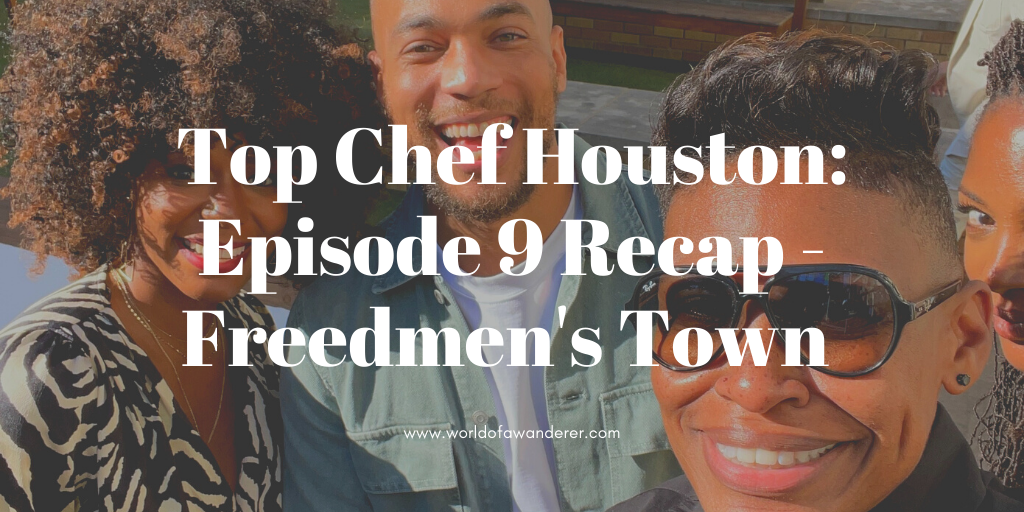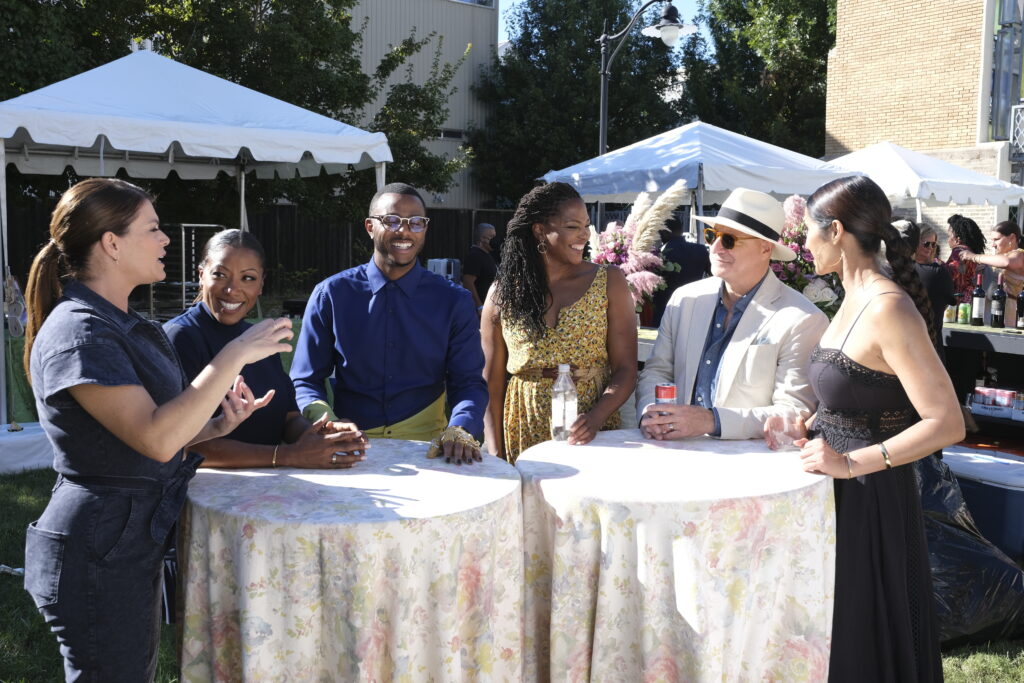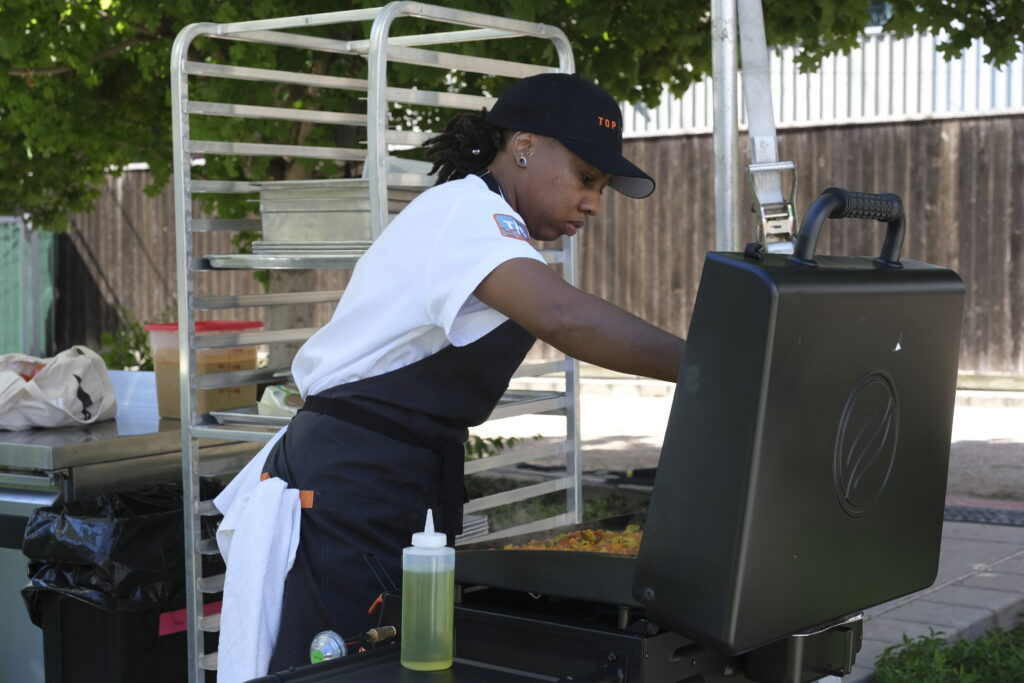If it’s one thing Houston is known for, it’s finger-lickin’ good food. So, it’s no surprise Bravo’s Top Chef revisited the Lone Star state, specifically Houston, for another season where chefs battle it out to come out on top.
Season 19, Episode 9 takes place in Freedmen’s Town — the nation’s only remaining post-Civil War historic district built by freedmen. The history that pervades the neighborhood, makes the location especially fitting for this episode that revolves around the idea of legacy and “creating something beautiful out of hard work”.
After the quickfire round of making monochromatic dishes for the judges, the contestants explored Freedmen’s Town with Executive Director of the Houston Freedmen’s Town Conservancy, Zion Escobar, at the helm.
The episode takes place at Bethel Baptist Church, one of Freedmen’s Town’s oldest churches that have since been converted into a community park. The seven remaining contestants prepare their take on soul food. For many, soul food is food that nourishes the soul. It gives you a taste of nostalgia and transports you to some indelible moment in time with every bite. Memories of titillating aromas wafting through the air from grandma’s kitchen, lending a helping hand as just a youngster, or reimagining generations-old recipes giving them a modern twist — this is what the contestants set out to do on the latest episode of Top Chef.
I was honored to be a guest in this episode, which also doubled as a fundraiser block party for Freedmen’s Town. The star-studded event drew guests such as Sylvester Turner, Houston’s mayor, as well as Kendrick Sampson, from the popular TV show Insecure. Top Chef alum Kwame Onwuachi and Dawn Burrell also served as guest judges on this soulful episode.
We sampled delectable dishes varying from southern soul food classics, to Mexican sopes and Malaysian curry. Contestants tapped into their respective cultures, weaving in personal stories of their childhoods that created the perfect recipe for some mouthwatering dishes that left us wanting more.
Luke Kolpin whipped his mom’s meatloaf and added a dash of Danish flare making it into the style of a frikadelle, a Danish meatball. Ashleigh Shanti tapped into her mother’s low-country roots and served up low-country crab rice with her mom’s oyster gravy. Nick Wallace wowed the crowds with his Nana’s salmon cast iron cake with a Hoppin’ John salad. Let me just say, Nana would be proud.
Buddha Lo, whose father recently passed of stage 4 cancer, always reminded him to cook from the heart, and he delivered with his grandmother’s rendition of Nasi Lemak – a Malaysian curry.
Jae Jung created a dish inspired by memories of her mother deboning cod fish and serving it to her on a spoon as a baby. Though, my least favorite dish, Jung’s flaked cod accompanied by Korean sweet potatoes, kimchi with pomegranate, and shrimp bisque were a favorite among judges.
A personal favorite for me was Evelyn Garcia’s sopes that she learned to make from her grandmother, topped with her mother’s chorizo recipe, pureed black beans, and pineapple pico de gallo. The fusion of flavors and textures was absolutely exquisite!
Damarr Brown created the perfect marriage between storytelling and food with his hoecakes and collard greens. As I would come to learn from Damarr, slaves would mix cornmeal and water, heat a garden tool that we know as a hoe, and cook the corn cakes on the blade, making hoecakes. This was also a top favorite for me.
With my heart and belly full, I got the opportunity to chat with Kwame Onwuachi, a former Top Chef contestant (season 13) and author of My America: Recipes from a Young Black Chef: A Cookbook. Onwuachi says he does not miss being on the contestant side of things at all, and much rather be in the position of being a judge. Onwuachi states, “At this point, I get to judge from a place of empathy. I’ve been on that side before.”
Growing up in the Bronx, living in Nigeria, and with a Jamaican, Trinidadian, and New Orleans Creole background, I was curious to know what is the singular place that Onwuachi feels shaped who is he today.
“New York,” he answered unequivocally.
“There’s no city like it. It’s a melting pot of so many different cultures and cuisines,” he continues. It was the place that “raised him during his most formidable years”.
We watch these chefs work tirelessly week in and week out to be the next Top Chef. I asked what advice he had for the chefs or entrepreneurs in general. “Just keep going. Just don’t stop. That’s the worst thing you can do — is let someone else’s perception of your success penetrate your beliefs and your dreams.”
Speaking of success, I asked, “How do you define success? Some people may come on Top Chef and may not make it to the final round and it may not be seen as a success. But, so many things come from this [being on Top Chef]. So many people bloom from Top Chef.”
Onwuachi states, “Success is happiness. You know, as long as you’re happy then you’ve never really lost. I think it’s not what happens to you, it’s how you react to what happens to you. So, if you’re able to take this experience and make the best of it, whether you win or you come in last place, I think it can be just as beneficial to you as if you win the whole thing. It doesn’t really matter. It’s what you do with it.”











